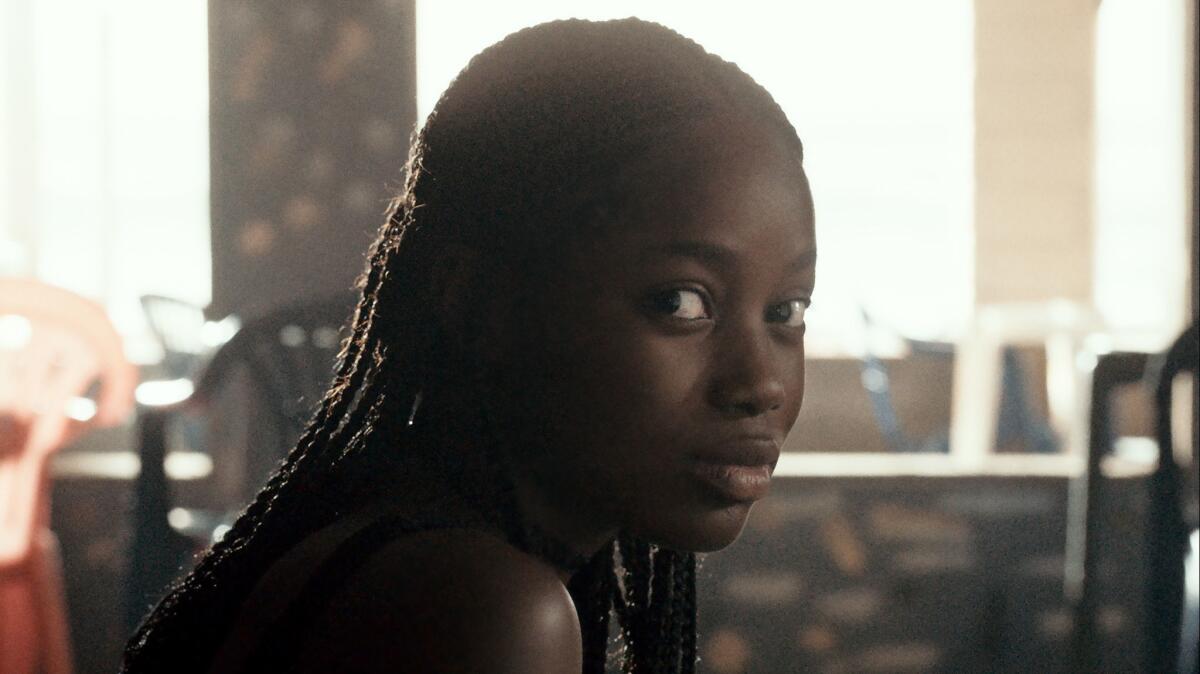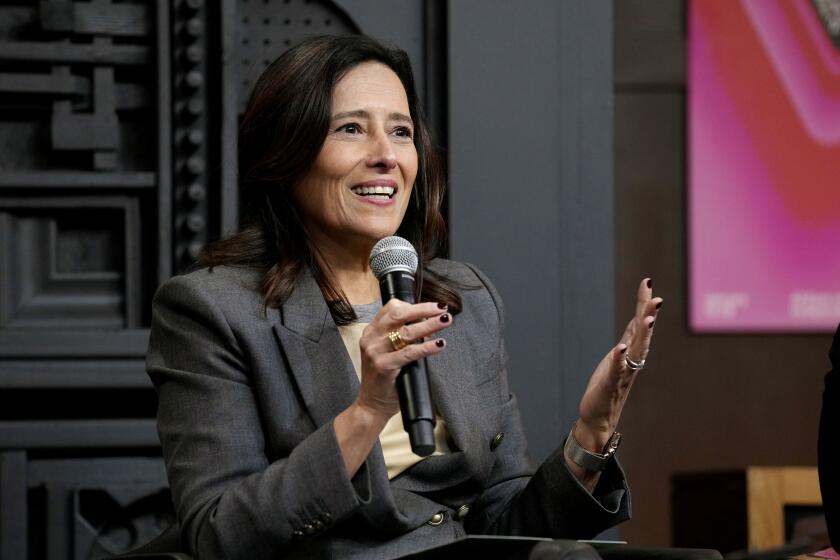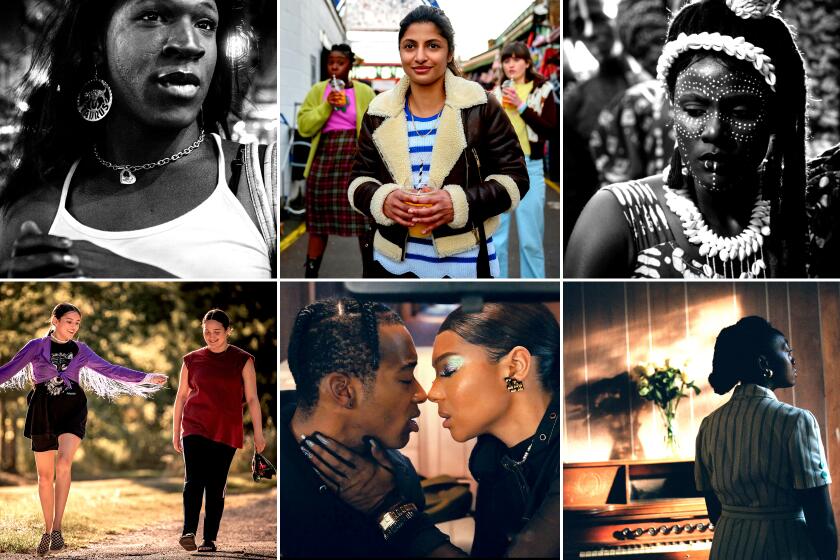At Cannes, genre filmmaking from ‘Parasite’ to ‘The Wild Goose Lake’ turns heads
Times critic Justin Chang is filing regular dispatches from the 72nd annual Cannes Film Festival, which runs through Saturday in France.
A surge of excitement runs through the crowd at the beginning of every gala screening at the Cannes Film Festival, as the movie’s director walks into the Grand Théâtre Lumière and is personally announced by the festival’s delegate general, Thierry Frémaux. Something unusual happened before the first competition screening of the Chinese crime thriller “The Wild Goose Lake,” however, as waves of applause greeted the arrival of a different director entirely.
The word spread quickly: Quentin Tarantino was in the house.
A few days before unveiling his own Palme d’Or contender, “Once Upon a Time … in Hollywood,” Tarantino walked up the red-carpeted steps of the Palais des Festivals and even drew applause as he entered the theater. It’s not often that you see a Cannes auteur checking out the competition. But Tarantino was clearly as eager as anyone to see “The Wild Goose Lake,” an ultra-moody, hyper-violent gangland thriller from a rising talent named Diao Yinan, who won the top prize at the 2014 Berlin International Film Festival for his wintry noir “Black Coal, Thin Ice.”
Tarantino’s love of extreme Asian cinema has informed much of his own work, and his work has been a fixture of Cannes for decades. He served as president of the 2004 festival jury that awarded the second-place Grand Prix to Park Chan-wook’s “Oldboy,” a brutal revenge thriller whose presence in the competition scandalized many at the time. Some even theorized that the movie had been programmed in competition specifically to cater to Tarantino’s tastes — quite successfully, if so.
These days, Park is a Cannes regular, and no one bats an eye when the competition features a movie in which a gun-toting thug is run through with an umbrella, to cite the most memorably grisly image in “The Wild Goose Lake.” The leveling of art-house and grindhouse tastes has been a small but significant part of Thierry Frémaux’s 18-year tenure at the helm of the festival, during which his competition slates have included out-and-out thrillers like Johnnie To’s “Vengeance,” Tarantino’s “Death Proof,” Park’s “Thirst,” Takashi Miike’s “Shield of Straw” and Nicolas Winding Refn’s “Drive,” which won a directing prize in 2011.
This year’s festival has been a particularly genre-forward one. The festival opened with Jim Jarmusch’s zombie-uprising comedy “The Dead Don’t Die,” one of several art-genre hybrids in the competition program. The others include “Parasite,” a crafty domestic thriller from South Korean director Bong Joon-ho; “Atlantics,” a haunting story of romance and loss with supernatural elements from French-Senegalese filmmaker Mati Diop; “Bacurau,” a bloody genre-blending western from the Brazilian directors Kleber Mendonça Filho and Juliano Dornelles; and “Little Joe,” an austere speculative fiction about genetic engineering from Austria’s Jessica Hausner.
All these movies are stories of survival, and most of them are cautionary tales, warnings about the consequences of trying to crush the helpless underfoot. As no one knew better than George Romero, the godfather of the zombie movie and an overtly referenced figure in “The Dead Don’t Die,” the mechanics of genre can often address such issues of cruelty and injustice with more bracing directness than a straightforward drama can.
No movie in the Cannes competition has demonstrated this more brilliantly than “Parasite,” a thrilling return to Korean filmmaking for Bong after two starry international efforts, “Snowpiercer” and “Okja.” He has always been a master of genre, as fans of his best films, the serial-killer chiller “Memories of Murder” and the monster movie “The Host,” will surely know. His latest begins, in deceptive fashion, as a darkly comic drama about a poor but extremely resourceful family of four, whose sly survival tactics may remind you of Hirokazu Kore-eda’s “Shoplifters,” last year’s celebrated Palme d’Or winner.
But if so, this is “Shoplifters” on bath salts — very pricey Korean bath salts. When one member of the family gets a job as a tutor in a wealthy household, it sets in motion an ingenious chain of events that Bong tracks with steadily mounting tension and clockwork precision. As an escalating freak show of tension, surprise and class rage, “Parasite” would make a terrific double bill with Jordan Peele’s “Us,” which it matches and perhaps even surpasses in pact. Bong’s movie may be the angriest, most confrontational thing I’ve seen in the competition, the rare parable of haves and have-nots that connects viscerally as well as intellectually.

A less violent story of two ill-matched families plays out with great visual beauty and tremulous emotion in Mati Diop’s “Atlantics,” which arrived in Cannes hailed as the first film in competition to be directed by a black woman, a milestone that is now happily behind us. The movie also happens to be Diop’s first feature, one that builds on her 2009 short film about a young Senegalese man who attempts to make the difficult ocean voyage to Spain. The new film focuses not on the migrant but on the girlfriend he leaves behind, Ada (Mama Sané), who is devastated by the loss of her love even as her parents arrange a marriage with another, much richer man.
One almost hesitates to classify Diop’s movie as an art-genre hybrid, which risks giving away some nifty surprises and diminishing its distinctiveness. Suffice to say that, shortly after a mysterious fire breaks out in Ada’s ridiculously lavish marriage bed, the story becomes both a detective thriller and a ghost story rooted in elements of local folklore, and pulled off with a light, shivery touch. Meanwhile, Diop never loses sight of the men who have left home for a better future, or the women they have left behind; hers is the rare picture to address the global migrant crisis with intense storytelling imagination as well as moral outrage.
The politics are on comparatively low boil in two other strong competition entries, both of which feel like pulpy, straight-ahead crime pictures and are no less welcome for it. One of these is Diao’s “The Wild Goose Lake,” a sinewy chase thriller set near the central Chinese city of Wuhan. Against a dingy backdrop of alleys, underpasses and housing blocks, plus the eponymous lakefront itself, a wounded gangster (Hu Ge) seeks to evade cops and rivals with the help of a prostitute (Gwen Lunmei) who’s as desperate to get away as he is.
The plot, artfully kinked with flashbacks, is often a fast-moving (and slow-moving) blur. There are brawls and decapitations, shootouts and impalings, plus one sad, fugitive moment of intimacy in a world where human relations are almost entirely transactional. The movie itself is about many things, from the brutal waste and expendability of life in contemporary China to the hard nocturnal shimmer of Dong Jinsong’s cinematography. (Dong served as director of photography on Bi Gan’s ravishing “Long Day’s Journey Into Night,” and his work here has the same rainy, neon-smeared beauty.)
“The Wild Goose Lake” is unapologetically down-and-dirty B-movie filmmaking, but with its stealth social commentary and matter-of-fact bleakness, you would never call it escapist entertainment. “The Whistlers,” an equally twisty cops-and-robbers tale, promises a more pleasurable movie-movie rush. A clever foray into “Ocean”-style heist-thriller territory for Romanian director Corneliu Porumboiu, it follows a detective named Cristi (Vlad Ivanov) caught between his fellow cops and the mobsters he’s successfully infiltrated; his true allegiance remains a mystery almost to the end.
Much of the chronologically scrambled story unfolds on the Spanish island of La Gomera, where Cristi must learn an obscure “whistling language” that will enable him to communicate with crooks without fear of being detected by wiretaps or surveillance cameras. It’s a delightfully eccentric hook, though I wish the movie, per its title, had explored it more fully: It’s a too-fleeting joy to watch Cristi stick his finger in his mouth and attempt to whistle, loudly, with the precise inflections that will translate ordinary speech into a decipherable code.
Porumboiu came to international prominence years earlier with conceptually rich pictures like “12:08 East of Bucharest” and “Police, Adjective,” both highlights of the new Romanian cinema that has flourished at Cannes for more than a decade. “The Whistlers” is something else entirely: With its intricate twists and double-crosses, plus an arresting if underused femme fatale named Gilda (Catrinel Marlon), it’s a much more accessible effort, but with no appreciable loss in brainpower. It’s also perhaps Porumboiu’s first movie that could easily be remade, insofar as whistling, much like genre itself, is a universal language.
More to Read
Only good movies
Get the Indie Focus newsletter, Mark Olsen's weekly guide to the world of cinema.
You may occasionally receive promotional content from the Los Angeles Times.







